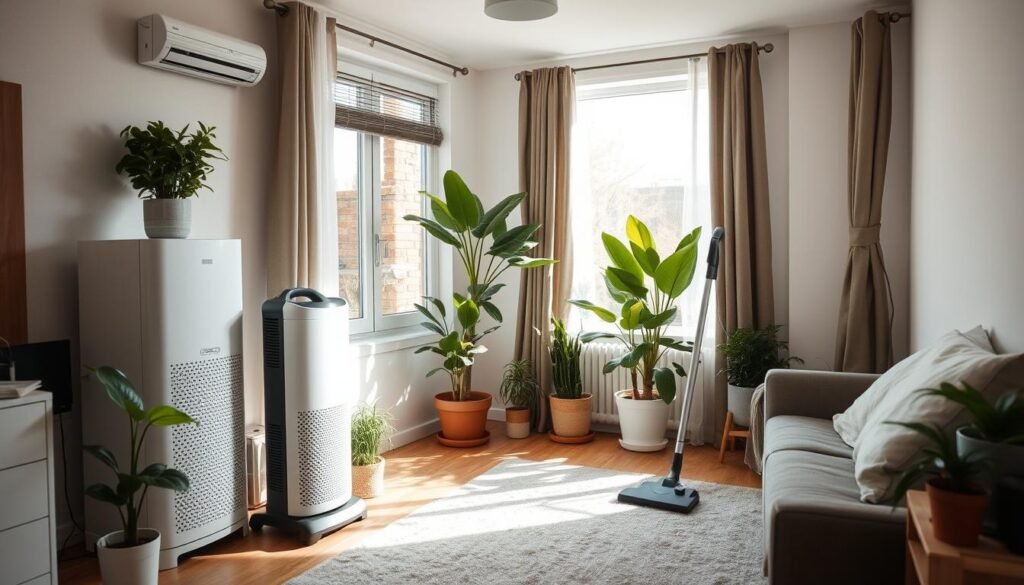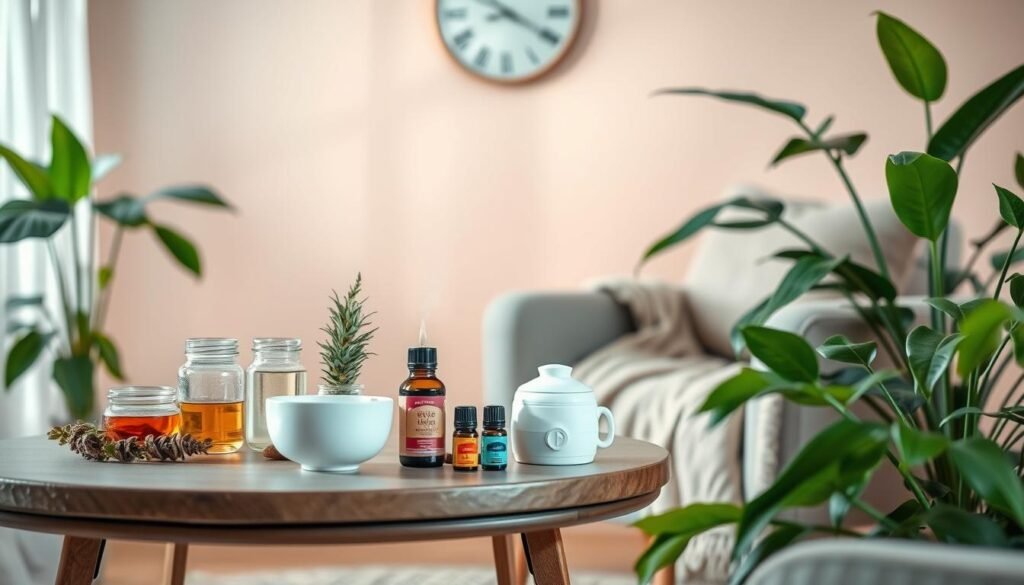It’s surprising, but true: more than two-thirds of people with allergies feel tired all year. This tiredness is known as fatigue allergies. It’s more than just feeling sleepy. It’s about having such low energy that your daily life suffers. Allergens like pollen, dust mites, or pet fur set off immune responses. These can cause physical symptoms and a deep sense of tiredness and energy loss.
Understanding this link between immune response and fatigue is vital. It impacts millions around the world. If you’re dealing with this, consider speaking to a health expert. They can help with the right diagnosis and treatment.
Key Takeaways
- Over two-thirds of those with allergies face year-round symptoms that can lead to chronic fatigue.
- Immune responses to allergens can drain energy levels and hinder restful sleep.
- Effective allergy management can alleviate symptoms and reduce feelings of tiredness.
- Common indoor triggers include dust mites, mold, and pet dander, all of which can induce fatigue.
- Consulting with healthcare providers helps identify specific triggers and tailor treatment options.
Understanding Fatigue Allergies
Understanding fatigue allergies helps us see the effect of allergies on health and happiness. Allergies often lead to sneezing, itchy eyes, and runny noses. These are common signs.
Fatigue is also a big clue that you might have allergies. Studies show that allergy sufferers feel more tired and less motivated during allergy season. This shows allergies can make you feel very tired and less able to do normal activities.
Recognizing signs of fatigue from allergies is key. Allergy fatigue often means having trouble thinking clearly, a problem called “brain fog.” It can make focusing hard, and allergies can also ruin your sleep. This can make you feel very tired during the day.
Understanding symptoms is crucial. Knowing your allergy triggers can help. Tests can find these triggers. Then, treatments like antihistamines or nasal irrigation can help lessen your symptoms. This can help you feel more awake and active.
Learning about these links is good for your health and improves your life. Seeing a doctor for a plan to manage your allergy fatigue is important. It’s a step towards feeling better.
The Immune Response to Allergens
Understanding the immune system’s reaction to allergens gives us valuable insights. When exposed to allergens like pollen, dust mites, or pet dander, the immune system reacts strongly. This leads to inflammation and discomfort.
How Allergies Trigger Immunoglobulin E
The immune system sees allergens as threats, causing the production of immunoglobulin E antibodies. These antibodies are key in signaling the release of histamines and other chemicals causing inflammation. Although this process aims to protect us, it often causes discomfort. The connection between immunoglobulin E and allergy symptoms is important. It starts the reactions that make us feel tired and show other physical symptoms.
The Role of Histamine in Allergy Symptoms
Histamine plays a critical role in allergic reactions, but it also leads to uncomfortable symptoms. When released, histamine causes itching, sneezing, and a runny nose. It also leads to inflammation that can make us feel even more tired. People might face chronic nasal congestion and disrupted sleep, making them feel lethargic. For more on the immune response, check this resource.
Common Allergic Reactions Associated with Fatigue
Many people get very tired because of allergic reactions. Learning how allergies make you tired can explain why some feel wiped out. This happens a lot during certain seasons or after eating specific foods.
Seasonal Allergies and Their Connection to Exhaustion
Seasonal allergies often lead to deep fatigue. In spring and fall, when pollen is high, the immune system fights hard. This fight takes away a lot of energy, making people sleepy and drained.
Nasal congestion, sneezing, and itchy eyes are common symptoms. These symptoms make our bodies use more energy to fight off these threats. That’s why it’s hard to stay focused and active. The fatigue from allergies can feel like you’re sick.
Food Sensitivities and Tiredness
Food sensitivities can also make you tired. If you eat foods that you are allergic to, you might feel really tired. You could get stomach pain or feel exhausted. This is because your body uses energy to fight these reactions.
Peanuts, tree nuts, wheat, soy, and shellfish can cause these problems. It’s important to know what foods trigger your allergies. Managing your diet can help keep your energy up and improve your health.
How Allergies Cause Chronic Fatigue
Allergies can change how you feel every day, leading to constant tiredness. This is mostly because your body fights allergens with an inflammation reaction, which uses a lot of energy. When you meet allergens, your immune system launches chemicals like histamines that make you more tired.
The Impact of Inflammatory Conditions on Energy Levels
Inflammatory reactions to allergens are a key reason for chronic fatigue. Fighting against things like pollen, dust, and certain foods keeps your body in a state of alert. This leads to symptoms like:
- Extreme tiredness
- Mental fog or cognitive confusion
- Irritability and reduced motivation
- Increased stress and anxiety
These symptoms can make you feel very low on energy. It becomes hard to do your daily tasks. That’s why it’s important to tackle these allergic reactions to feel better and more energetic.
Constant Nasal Congestion and Sleep Disruption
Chronic nasal congestion from allergies can also ruin a good night’s sleep. It makes breathing difficult, leading to poor sleep quality. Because of this, you might face:
- Sleep disruption
- Nighttime awakenings
- Increased risk of sleep apnea and other sleep disorders
This ongoing sleep trouble makes you feel tired all day. The cycle of bad sleep because of nasal congestion needs addressing. This is key to overcoming that overwhelming tiredness.
Recognizing Symptoms of Allergy Fatigue
It’s critical to understand the symptoms of allergy fatigue. Many people have brain fog, leading to trouble thinking clearly and focusing. This can really impact your daily life and mental well-being. Knowing the signs is key to getting back to normal.
Identifying Brain Fog and Cognitive Confusion
Brain fog is common with allergy fatigue. People often experience:
- Difficulty focusing on tasks
- Memory lapses or forgetfulness
- Increased confusion in decision-making
These symptoms can cause distress. If allergies keep up, it could lead to anxiety or depression. Around 50 million Americans deal with allergies each year, which can make them feel mentally tired.
Other Common Symptoms Linked to Allergy Fatigue
Allergy fatigue also shows up as physical symptoms, making it hard to spot:
- Nasal congestion
- Headaches
- Muscle pain and physical weakness
These issues can lower your quality of life. Allergies disturb your sleep, leading to more tiredness and less sharpness during the day. If you’re dealing with allergy fatigue, it’s important to understand these linked symptoms.
| Symptom | Description | Impact on Daily Life |
|---|---|---|
| Brain Fog | Lack of mental clarity and memory issues | Difficulty in focusing, making decisions |
| Nasal Congestion | Blocked airways causing discomfort | Disrupted sleep and irritability |
| Physical Weakness | Fatigue affecting energy levels | Reduced productivity, reliance on rest |
Environmental Triggers that Lead to Fatigue
It’s key to know what in our environment makes us feel tired. Both things inside and outside our homes can drain our energy. Knowing what these things are can help us handle them better.
Indoor vs. Outdoor Allergen Sources
Inside our homes, mold and dust mites are big problems for many. Dust mites love warmth and moisture and can cause itchy eyes and sore throats. Mold loves wet places and can stuff up our noses and make us sneeze.
Outside, pollen from trees, grasses, and weeds can bother us throughout the year. Tree pollen pops up in early spring. Grass pollen shows up in late spring and summer. And weeds like ragweed appear at the end of summer. Since when and what type of pollen is out changes, it’s important for people with allergies to keep track.
How Mold and Dust Mites Impact Wellness
Mold and dust mites can really affect how well we feel. They can cause allergic reactions that lead to ongoing problems if ignored. Being around mold can make breathing problems worse and mess with our sleep, making us tired.
Dust mites, hiding in beds and furniture, can really bother people with asthma. To deal with these allergens, it helps to clean regularly, keep our homes not too humid, and use special covers for our beds and pillows.

| Allergen Type | Common Sources | Symptoms | Health Impact |
|---|---|---|---|
| Mold | Damp areas (bathrooms, basements) | Nasal congestion, sore throat, sneezing | Can exacerbate asthma and cause fatigue |
| Dust Mites | Bedding, carpets, upholstered furniture | Itchy eyes, scratchy throat, runny nose | Linked to sleep disruption and asthma |
| Pollen | Trees, grasses, weeds | Nasal congestion, fatigue, headache | Seasonal fatigue and decreased quality of life |
By learning more about these environmental triggers, we can better protect ourselves. Taking steps to reduce our exposure can help lessen tiredness.
Impact of Allergy Medications on Energy Levels
Many seek relief from allergies through various medications. It’s key to know how some treatments can impact your energy. This is especially true for antihistamines. They are crucial in controlling allergy symptoms. Yet, they may make you feel more tired due to their ability to cause drowsiness.
Understanding Antihistamines and Drowsiness
Antihistamines help reduce symptoms like sneezing, runny nose, and itchy eyes. While they are effective, a common side effect is drowsiness. This can decrease your daily energy and alertness. It makes dealing with work or social life harder. Knowing about these side effects is important for anyone with allergies.
Exploring Non-Drowsy Alternatives
It’s important to find non-drowsy options if you want to stay alert. There are nasal sprays and specific antihistamines that won’t make you sleepy. These options help you stay energetic while managing your allergies. They can improve your life’s quality.
| Medication Type | Common Effects | Drowsiness Potential |
|---|---|---|
| First-Generation Antihistamines | Effective for allergies, can cause sedation | High |
| Second-Generation Antihistamines | Relief from allergies with minimal sedation | Low |
| Nasal Sprays | Targeted relief, fast action | None |
| Allergy Immunotherapy | Long-term allergy relief | None |
Understanding the drowsiness from antihistamines is key in handling allergy-related fatigue. By looking into non-drowsy solutions and minimizing sleepiness, you can better manage your energy. This helps in treating allergies more effectively.
Strategies for Allergen Avoidance
Avoiding allergens is key to managing allergy-related tiredness. A good plan for your home can cut down on allergens. By using smart methods, people can make their homes healthier. This reduces their contact with allergens that make them feel bad.
Effective Home Management Techniques
Keeping a clean home is vital. Dust mites love moisture. Cleaning surfaces can lessen their numbers. Also, an air purifier with a HEPA filter can trap many allergens in the air.
In cities, it’s important to deal with cockroaches; they’re bad for allergies. Clean kitchens well and seal cracks to keep them out.
How to Limit Exposure to Common Allergens
Knowing how to avoid common allergens matters if you have allergies. Knowing when pollen is high helps plan outside time. On days with lots of pollen, staying inside can help a lot.
These allergen dodging tips can make you feel better. For more on keeping your glands healthy with diet and lifestyle, check natural remedies for adrenal fatigue.

When to Consult a Healthcare Provider
Many people don’t realize how much allergy fatigue affects them every day. Knowing when to get help can really change how you handle symptoms, making you feel better overall. If your allergy symptoms are bad or you feel very tired and can’t focus, it’s time to see a doctor. It’s very important to know when to ask for help to take care of your health.
Signs That It’s Time to Seek Help
If you’re dealing with allergy fatigue, watch out for these signs that you need to see a professional:
- Severe nasal congestion and persistent coughing that lasts longer than typical cold symptoms
- Recurring sinus infections or ear infections that develop due to uncontrolled allergies
- Significant fatigue impacting daily activities such as work or school
- Lack of relief from over-the-counter medications, like antihistamines and decongestants
- Symptoms leading to irritability or difficulty concentrating
Testing and Diagnosis for Fatigue Allergies
Getting the right diagnosis is key to managing allergy fatigue. It’s good to know about the tests doctors use. They often do:
- Skin-prick tests to evaluate specific allergen responses
- Blood tests to identify the presence and level of allergen-specific antibodies
After finding out what you’re allergic to, doctors can make a plan just for you. This might include allergy shots, sublingual immunotherapy, or changing things in your life to avoid allergens. The right tests and diagnosis can ease your symptoms and fight off that constant tired feeling.
Treatment Options for Allergy Fatigue
There are many ways to treat allergy fatigue. These treatments can really help with allergy symptoms and tiredness. Knowing about the different drugs can help people choose the best option for their health.
Medications that Can Help Alleviate Symptoms
There are a few medications that can ease the discomfort of allergies. Antihistamines are one kind, helping to stop sneezing, itching, and a stuffed nose. They work against the body’s reaction to allergens, making you feel better and less tired.
Corticosteroids are another option. They reduce swelling and symptoms related to that. Nasal sprays or inhalers can offer relief by targeting allergy symptoms directly. A detailed look at the available medications can help you find a specific solution for your situation.
Mast cell stabilizers and leukotriene inhibitors are also helpful in treating allergies. They offer more ways to tackle tiredness from ongoing allergy symptoms.
Potential Benefits of Allergy Shots
Allergy shots, or immunotherapy, are a long-term fix for allergy fatigue. They make your immune system less sensitive to allergens over time. This means fewer allergic reactions and more energy. For those with constant tiredness from allergies, allergy shots can make a big difference in their lives.
Seeing a healthcare provider regularly can help figure out the best treatment plan for you. The main goal is to improve your well-being and energy, not just now but for the future.

| Medication Type | Action | Common Forms | Example Medications |
|---|---|---|---|
| Antihistamines | Reduces sneezing and itching | Pills, sprays, eye drops | Loratadine, Cetirizine |
| Corticosteroids | Minimizes inflammation | Nasal sprays, inhalers | Fluticasone, Budesonide |
| Mast Cell Stabilizers | Prevents allergic reactions | Nasal sprays, eye drops | Cromolyn |
| Decongestants | Relieves nasal congestion | Pills, nasal sprays | Pseudoephedrine |
| Immunotherapy | Reduces reaction severity | Injections, sublingual tablets | Allergy shots, SLIT |
Daily Habits to Combat Allergy-Induced Tiredness
Effective habits are crucial for tackling allergy-induced tiredness. It’s important to focus on good sleep and eating well. Doing so helps lower tiredness. Plus, it boosts health and defense against allergens.
Importance of Rest and Sleep Hygiene
Good rest is key, especially with allergies that hurt sleep. Good sleep habits can really help your energy. Here are ways to sleep better:
- Keeping a consistent sleep schedule to regulate the body’s internal clock.
- Creating a calm sleeping environment by reducing noise and light.
- Avoiding screens before bedtime to enhance melatonin production.
- Using air purifiers to minimize indoor allergens and improve air quality.
Nutrition’s Role in Managing Fatigue
What you eat affects your energy, especially when dealing with allergies. The right foods can lessen tiredness and boost health. Try these eating tips:
- Incorporating whole foods rich in vitamins and minerals to support immune function.
- Avoiding processed foods that may trigger allergic reactions and exacerbate tiredness.
- Staying hydrated to maintain energy and cognitive function throughout the day.
Choosing the right foods can help control allergy symptoms and fight off tiredness. With the right habits, you can beat the exhaustion allergies bring.
Conclusion
Fatigue allergies pose a real challenge for many people, impacting their energy and well-being. Not getting enough sleep due to allergens can start a tough cycle. This cycle can lead to less work done, feeling down, and memory problems. These issues might be because of immune responses that keep going even after the allergen is gone. This shows how complex the problem is, and why it’s important to pay attention and maybe test for allergens.
It’s key to know how common environmental allergens affect our day-to-day life. Finding out what exactly causes your symptoms can really help in dealing with them better. This means less exposure to what triggers your allergies. Treatments like antihistamines you can buy without a prescription and allergy shots are widely used. They show that many people need effective solutions for fatigue allergies.
Realizing how allergies and feeling tired are connected is vital for a better life. If you’re dealing with fatigue because of allergies, getting help from experts can make a big difference. They can offer personal advice that improves your life quality. This helps lessen the ongoing effect of allergies on your everyday activities.